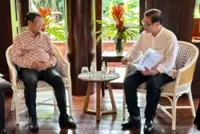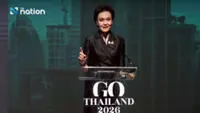BANGKOK: Thai Prime Minister Paetongtarn Shinawatra (pic) faces an uncertain future and could become the third leader from the Shinawatra clan member to lose power over the past 19 years.
The Constitutional Court has suspended her over an ethics probe that could disqualify her as prime minister. The move comes as her government faces coalition infighting, US trade talks, a border dispute with Cambodia and a sluggish economy that has lagged behind most of its South-Est Asian peers.
At the heart of the crisis is Paetongtarn’s leaked phone call with Cambodian strongman Hun Sen, which has fueled public outrage and could bring down the government before the court rules.
Here are four things to watch ahead of the ruling as the crisis unfolds:
Coalition collapse
Paetongtarn has been left with a wobbly coalition after the exit of Bhumjaithai Party, which was her biggest ally with 69 lawmakers in the 495-member House of Representatives. The other nine parties in the coalition have pledged to stay with Paetongtarn’s ruling Pheu Thai Party - for now.
If any more parties decide to leave after the court’s decision, the coalition - now holding about 255 seats - could quickly collapse. Five of the remaining parties each have at least nine lawmakers, enough to shift the balance and push the government into a minority.
"Political pressure will mount on coalition partners to distance themselves from what appears to be a sinking ship,” said Napon Jatusripitak, acting coordinator of the Thailand Studies Program at ISEAS-Yusof Ishak Institute. "This pressure will only intensify as street protests grow over the coming weeks.”
A coalition collapse would strip the government of its mandate. Even if it remains in office, it would likely face legislative gridlock, unable to pass new laws.
Dissolution of Parliament
A political stalemate is especially concerning as the National Assembly prepares to debate key economic bills, including the next fiscal budget for the year that begins in October. If the government fails to pass the budget, the prime minister typically dissolves the parliament to trigger a new election.
An election must be held within 45 to 60 days of a royal endorsement to dissolve parliament. But forming a new government could take months due to coalition talks ahead of a prime ministerial vote.
While suspended, Paetongtarn cannot exercise her authority to dissolve parliament. That power now lies with acting leader Suriya Jungrungreangkit, who is expected to hand over the role to Phumtham Wechayachai after the swearing-in ceremony on Thursday (July 3).
The opposition People’s Party has been calling for this scenario, saying it is the only way to stop the crisis from spinning out of control and precipitating military intervention.
Escalating protests
More than 20,000 people rallied in Bangkok in late June to demand Paetongtarn’s resignation - the largest such turnout in years. The 12-hour protest was largely peaceful and orderly. Many of the organisers were longtime critics of the Shinawatra family.
Some protest leaders were also involved in demonstrations that paved the way for military coups in 2006, which toppled Paetongtarn’s father Thaksin Shinawatra, and in 2014, ending Yingluck Shinawatra’s government.
Last month’s protesters echoed earlier movements against past Shinawatra governments, such as cardboard signs saying "traitor,” the colour yellow and the use of the Thai national flag.
Although the protest leaders officially deny inviting a military coup, some of them have suggested that they would find it acceptable if it happens on its own course.
Tension With Cambodia
Paetongtarn said her contentious phone call with Hun Sen was meant to ease tensions between Thailand and Cambodia as both sides imposed tit-for-tat trade and travel restrictions, following an exchange of gunfire on May 28 near the disputed Chong Bok region that left one Cambodian soldier dead.
The situation worsened after Cambodia petitioned the International Court of Justice to rule on four territorial disputes, including Chong Bok. Cambodia has pushed for third-party involvement, but Thailand prefers bilateral talks and does not recognise the ICJ’s mandatory jurisdiction.
The conflict has also spilled online. Hun Sen posted the phone recording that put Paetongtarn under fire on Facebook, while his son, Prime Minister Hun Manet, regularly criticised Thai border policies on social media.
Last week, Hun Sen threatened to "expose” Thaksin, with whom he had enjoyed close personal relations for decades, and went on to call for a leadership change in Thailand, saying he doubted Paetongtarn’s ability to resolve the escalating conflict.
Seen as a political wild card, Hun Sen has escalated tensions between two of the region’s most prominent dynasties - the Huns and the Shinawatras - and stoked speculation of what he may have in store next. - Bloomberg





